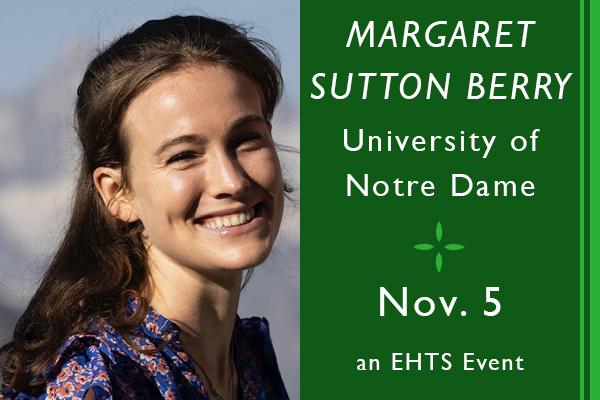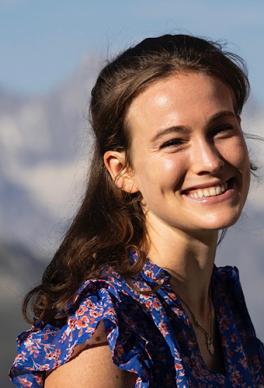

Abstract: “On These Rocks I Will Build My Church: Sir Arnold Lunn, Dolores LaChapelle, and the Search for a Catholic Way of the Mountain, 1888-2007”
Please check back for access to the talk when it is closer to the date.
After getting caught in an avalanche while skiing beyond the bounds of Utah’s Alta Resort on March 2, 1963, Dolores LaChapelle (1926-2007) attributed salvific power to the snow that almost killed her. “I have died in the air and been reborn under the snow,” the “godmother of powder skiing” mused. LaChapelle celebrated the avalanche as the lynchpin of her spiritual and intellectual conversion. She claimed that it forced her not only to reckon with the more-than-human power of the Wasatch Mountains but also to abandon her Catholic faith, which she came to see as too anthropocentric. The “way of the mountain” she forged in her last decades was equally catholic, that is, universal, in scope. LaChapelle insisted that all moderns join her in rejecting western religious traditions and taking up biocentric ways of being, lest the world fall into social and environmental ruin.
On July 13, 1933, “father of modern alpine ski racing” Sir Arnold Lunn (1888-1974) entered into the same church LaChapelle came to reject. It was an unexpected move for someone who had written a scathing critique of fellow “Roman Converts” only nine years prior and at age thirty, expressed that he “cared nothing for the philosophy of Christianity.” But Lunn, like LaChapelle, credited the mountains with revelatory power. While mountains awakened LaChapelle to the incompatibility of Catholicism and ecological consciousness, they reinforced Lunn’s path to Rome and the sacramental worldview he discovered within it. The “ski pope” became one of the twentieth century’s most stalwart Catholic apologists, and he regularly invoked the mountains as natural evidence of the Catholic Church’s divine authority.
Through the lens of ski pioneers Lunn and LaChapelle, my study illuminates the ways that twentieth century Catholic faith was born of, reinforced by, and challenged in the mountains. Doing so bridges a crucial historiographical gap. While there is no shortage of scholarship on either mountain sports or the complex story of Catholicism in the twentieth century North Atlantic, historians have insufficiently addressed the relationship between the two. By bridging these two fields, my dissertation illustrates the ways that English and American Catholics used nonhuman nature to reconcile two tensions in their belief: between divine omnipotence and free will, and between the progressive, liberating aspects of Catholicism and its conservative teachings.
Given their influence and the extensive corpus of materials they left behind, Lunn and LaChapelle each offer a privileged lens into this dynamic. They reveal the ways that the Rocky Mountains and Swiss Alps became potent agents of spiritual and intellectual conversion for middle-class urbanites in England and America. On the one hand, mountain activity helped these individuals actively resist the abstracting forces of modern economic, political, and social life. On the other hand, the mountains became literal and figurative rocks for alpinists to naturalize their antiliberal, catholic worldviews.
About Margaret Sutton Berry: Margaret is a Ph.D. candidate in the Department of History. Her dissertation explores the religious conversions of English skier Sir Arnold Lunn (1888-1974) and American skier Dolores LaChapelle (1926-2007) to illuminate the relationship between mountain experience, metaphysical meaning making, and nation building in the twentieth century North Atlantic world. She argues that modern mountain sports not only became secularized “replacement religions” for middle- and upper-class urbanites but also pathways for returning to and reimagining orthodox traditions. Despite their divergent religious journeys––Lunn, from agnosticism to Roman Catholicism, and LaChapelle, from Roman Catholicism to Daoism––both ski pioneers leveraged their backcountry experiences to resist what they perceived as a disenchanted, materialistic, and progress-oriented “Industrial Growth Society.” On the one hand, they embraced skiing as a counterforce to the flattening motors of modernity––liberalism, global capitalism, and secularism, specifically––claiming esoteric, unmediated encounters with alpine ecosystems to assert the superiority of antimodern modes of being. On the other, in approaching powder fields as tabula rasa for self-actualization, these skiers embodied the very progressive ethos they wished to escape. They effectively functioned as vectors of state and industrial expansion, altering both the mountains and religious landscape in the process.
Before pursuing her doctoral studies, Margaret worked as a high school teacher and field instructor in Montana, Massachusetts, and Wyoming. She also holds a B.A. from Williams College and an M.A. in Teaching from Montana State University.
